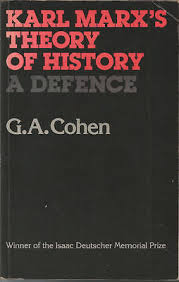Karl Marx's Theory of History: A Defence

Cover of the first edition
|
|
| Author | Gerald Cohen |
|---|---|
| Country | United States |
| Language | English |
| Subject | Karl Marx |
| Published | 1978 (Princeton University Press) |
| Media type | Print (hardcover and paperback) |
| Pages | 369 |
| ISBN | |
Karl Marx's Theory of History: A Defence is a 1978 book by Gerald Cohen, the culmination of his attempts to reformulate Karl Marx's doctrines of alienation, exploitation, and historical materialism. Cohen, who interprets Marxism as a scientific theory of history, applies the techniques of analytic philosophy to the elucidation and defence of Marx's materialist conception of history.
The work for which Cohen is best known, Karl Marx's Theory of History helped to establish Analytical Marxism and was awarded the Isaac Deutscher memorial prize. Cohen's interpretation of Marx runs counter to most forms of twentieth century Marxism and has been seen as a form of technological determinism. Critics have seen its determinism as misguided.
Cohen maintains that the technological determinism of Marx's summary of his science of history in the preface to A Contribution to the Critique of Political Economy defines his real views on the subject, a view with which other scholars have disagreed. This interpretation of Marx closely resembles that of Karl Kautsky and Georgi Plekhanov, and runs counter to most forms of twentieth century Marxism, which emphasized the importance of the relations of production. Cohen employs analytic philosophy to make his case. He defends technological determinism by arguing for two theses, which he calls the "development thesis" and the "primacy thesis." The development thesis rests upon three presuppositions: that human beings are "somewhat rational", that their historical situation is one of scarcity, and that they "possess intelligence of a kind and degree which enables them to improve their situation." The existence of scarcity ensures a struggle for survival, the existence of intelligence ensures that scarcity-reducing innovations will occur, and the existence of rationality ensures that there will be a tendency to adopt them. Cohen seeks to establish the primacy thesis by arguing that different relations of production have differential capabilities for generating growth in the productive forces at different stages of development.
Cohen proposes that explanation in Marx’s theory is functional, by which he means roughly that the character of what is explained is determined by its effect on what explains it, so that "production relations profoundly affect productive forces, and superstructures strongly condition foundations." Functional explanation provides a way of recognizing the vital influence of the legal-political superstructure on the economic structure, while still assigning explanatory primacy to the latter. Thus the superstructure stabilizes its economic base, but in the other direction the economic relations determine the character of the superstructure, so that in this sense the economic base is primary and the superstructure secondary. It is precisely because the superstructure strongly affects the base that the base selects that superstructure. The relation between forces and relations of production is also explained functionally: the level of development of society’s productive forces (i.e., society’s technological powers, including tools, machinery, raw materials, and labour power) determines society’s economic structure, in the sense that it selects a structure of economic relations that tends best to facilitate further technological growth. As Charles Taylor puts it, "These two directions of influence are so far from being rivals that they are actually complementary. The functional explanation requires that the secondary factor tend to have a causal effect on the primary, for this dispositional fact is the key feature of the explanation."
...
Wikipedia
